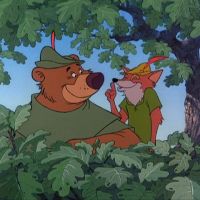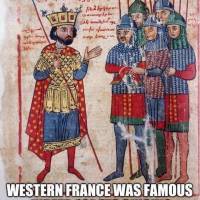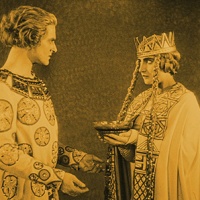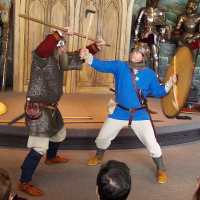In Norse Myth there is a minor tale about the marriage of Njörd and Skaði. Njörd was from the sea and Skaði was from the mountains. They met in Asgard – the hall of the Aesir. After they married, they had difficulty agreeing on where they should live together. Skaði wanted to live on her family homestead in the mountains whereas Njörd wanted to live by the sea. After some discussion, they planned to spend nine nights in the mountains and then nine nights by the sea.
So, to the mountains they went for nine days. When they returned to Asgard, Njörd said this:
Mountains I loathed,
no longer than nine
nights did I stay there,
the howling of the wolves seemed ugly to me
compared to the hooping of swans.[1]

image: Daniel Heuclin / www.photoshot.com Original URL
Next, they spent nine nights by the sea. When they returned to Asgard, Skaði had this to say about the sea:
I could not sleep
by the shore of the sea
for the noise of the mew
that awakened me,
the bird that flew
each dawn from the deep.[2]

Swans by a Baltic shore at Käsmu, Estonia. image: Jon Weaver
After this, they parted ways. Skaði went up to live in the mountains and Njörd stayed by the sea.
While there’s more to tell about these characters than this episode, this story has always bothered me. I don’t really tell it often. I mean, you can start the story with how Njörd is the god of the sea like Neptune and that sailors and fishermen are constantly concerned with staying on his good side and that they must give him all of the credit for safe voyages and good catches and everything, and that Skaði was the goddess of what it takes to survive hard winters in the mountains. While everyone huddles around a weak fire with their teeth a-chattering, she’s out bow hunting in a snowstorm.
Of course, that wasn’t all Skaði was known for. When the Aesir bound Loki to await Ragnarök, they called in Skaði to help design his eternal punishment. Now, in an old Greek story, the trickster Prometheus was chained to a rock at the top of a mountain where an eagle lived. This eagle loved liver, and he loved it most while his prey struggled to escape his bonds. A terrible and painful punishment for Prometheus indeed, but Skaði wanted Loki to have something that lasted a little longer. If you’ve ever heard of Loki’s binding, you’ll recall that someone “fastened a viper above Loki’s head to drip burning venom on his face.”[3] That was Skaði’s idea.

“The Punishment of Loki” James Doyle Penrose (1912) Original URL
How Njörd and Skaði met is interesting too. Skaði came to Asgard prepared to burn it down and kill everyone there as recompense for the death of her father Thjazi – Thjazi is the giant who stole Iðun and her apples – which kept the Aesir young and fit – from Asgard. Though Loki was technically responsible for it – that’s another story – some said the trickster got what was coming to him.
But the Aesir were never ones to leave a blood price unpaid so they gave Skaði an audience and took her demand seriously when she rattled the walls of Asgard with a crude spear. They were moved by her bravery and were so impressed with her skills as an archer that they didn’t dare arrange a competition – simply out of knowing that they would never recover from talk of their defeat. The Aesir decided on a blood price for Thjazi’s death: Skaði could choose any one of the Aesir to be her husband. The only condition was that she must choose her suitor entirely by his feet. She agreed to the deal.
Knowing that Baldr was the most handsome of all of the Aesir, she chose the pair of what she thought were the most handsome feet in Asgard. Because of this, she mistook Njörd for Baldr – I guess good old sand and surf were the best exfoliants then. But even though she meant to select someone else, she quickly grew deeply in love with Njörd as she got to know him.
So it’s this that bothered me: these two gods ended their marriage simply because they couldn’t compromise on a suitable living arrangement. We see it even today. People have different career ambitions or maybe they can’t handle living in certain conditions or sharing money and power in a mutually agreeable way. Perhaps they aren’t willing to live without certain amenities or use resources in a certain way – even if it means staying with the person they married. We can all easily think of many examples of marriages ending due to irreconcilable differences these days. Each of us knows at least several people who have been divorced and often multiple times. In 2009, the numbers showed that roughly 46 percent of American couples’ marriages end in divorce before they reach their 25th wedding anniversary.[4]
I have no idea what the divorce statics were in Asgard, but women could divorce their husbands in Viking Age Iceland.[5] It’s interesting to see an example of divorce in Norse Myth – not necessarily to confirm that it occurred, but to see that it was not a subject considered taboo enough to be left out of a story.
Anyway, as storytellers – should we accept the responsibility of carrying on the skaldic tradition – it is always our choice what to embellish and what to leave out… and what to flat out fabricate for our own purposes. In a version of the tale told by Padraic Colum, Njörd and Skaði stay together. Here’s how he does it:
These two, Niörd and Skadi, went first to live in Niörd’s palace by the sea; but the coming of the sea mew would waken Skadi too early in the morning, and she drew her husband to the mountain top where she was more at home. He would not live long away from the sound of the sea. Back and forward between the mountain and the sea, Skadi and Niörd went.[6]
This version keeps Njörd and Skaði together by taking the steadfast tone typical of Norse Myth and using the nine nights spent at each location to create a situation that is made eternal with perpetual give and take.
[1] Snorri Sturluson, The Prose Edda, trans. Jean I. Young (Berkeley, 1954), 52.
[2] The Prose Edda, 52.
[3] Douglas “Dag” Rossman, The Northern Path, (Chapel Hill, 2005), 153.
[4] Hope Yen, “Census: Divorces Decline In United States,” Huffinton Post, (18 May 2011). Accessed 07/13/2013. Available online: http://www.huffingtonpost.com/2011/05/18/census-divorces-decline-i_n_863639.html
[5] William R. Short, Icelanders in the Viking Age, (Jefferson, 2010), 36.
[6] Padraic Colum, Nordic Gods and Heroes (Dover: Mineloa, 1996), 63.












